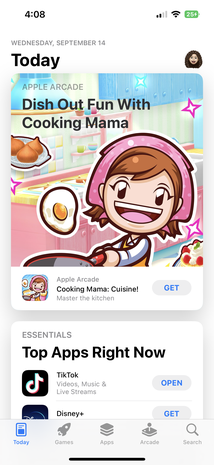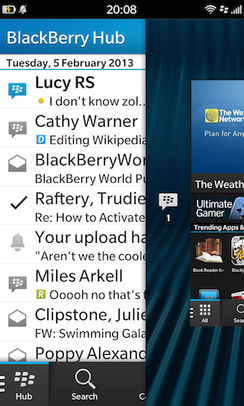
BlackBerry was a brand of smartphones and other related mobile services and devices. The line was originally developed and maintained by the Canadian company BlackBerry Limited from 1999 to 2016, after which it was licensed to various companies.

BlackBerry Limited is a Canadian software company specializing in cybersecurity. Founded in 1984, it developed the BlackBerry brand of interactive pagers, smartphones, and tablets. The company transitioned to providing software and services and holds critical software application patents.
Keek was a free online social networking service that allowed its users to upload video status updates, which were called "keeks". Users could post keeks to the Keek website using a webcam or via the Keek mobile apps for iPhone, Windows Phone, BlackBerry, or Android. Users could also reply back with text or video comments, known as "keekbacks", and share content to other major social media networks. There was also an embed option so users could embed their keeks into a blog or website.

Seesmic was a suite of freeware web, mobile, and desktop applications which allowed users to simultaneously manage user accounts for multiple social networks, such as Facebook and Twitter.

The App Store is an app marketplace developed and maintained by Apple, for mobile apps on its iOS and iPadOS operating systems. The store allows users to browse and download approved apps developed within Apple's iOS SDK. Apps can be downloaded on the iPhone, iPod Touch, or iPad, and some can be transferred to the Apple Watch smartwatch or 4th-generation or newer Apple TVs as extensions of iPhone apps.

BBM, also known by its full name BlackBerry Messenger, was a consumer-oriented proprietary mobile instant messenger and videotelephony application service originally developed by BlackBerry Limited and later briefly by Indonesian company Emtek under licence. Initially it was included and offered on BlackBerry devices before it was expanded cross-platform. BBM was shut down on 31 May 2019; the company since continues to offer the paid enterprise edition, BBM Enterprise.
BlackBerry World was an application distribution service by BlackBerry Limited. The service provided BlackBerry users with an environment to browse, download, and update mobile apps, including third-party applications.

OpenFeint was a social platform for mobile games for devices running on Android or iOS. It was developed by Aurora Feint, a company named after a video game by the same developers. The platform consisted of an SDK for use by games, allowing its various social networking features to be integrated into the game's functionality. OpenFeint was discontinued at the end of 2012.
Game Center is a service by Apple that allows users to play and challenge friends when playing online multiplayer social gaming network games. Games can now share multiplayer functionality between the Mac and iOS versions of the app.
Telenav, Inc. is a wireless location-based services corporation that provides services including Global Positioning System (GPS) satellite navigation, local search, automotive navigation solutions, mobile advertising, enterprise mobility and workflow automation. The company’s headquarters are located in Santa Clara, California in the United States with additional offices in the U.S., Germany, Japan, Romania, China, and Brazil.

Amazon Appstore is an app store for Android-compatible platforms operated by Amazon.com Services, LLC, a subsidiary of Amazon.

BlackBerry 10 (BB10) is a discontinued proprietary mobile operating system for the BlackBerry line of smartphones, both developed by BlackBerry Limited. Released in January 2013, BlackBerry 10 is a complete rework from the company's previous BlackBerry OS software.
A mobile application or app is a computer program or software application designed to run on a mobile device such as a phone, tablet, or watch. Mobile applications often stand in contrast to desktop applications which are designed to run on desktop computers, and web applications which run in mobile web browsers rather than directly on the mobile device.

News360 was a personalized news aggregation app for smartphones, tablets and the web. It attempted to learn a user's interests by analyzing their interaction with news stories on the app and using semantic analysis and natural language processing to create an Interest Graph and construct a unique feed of relevant content for each user. The app claims an audience of more than 4 million users.

Upptalk was a proprietary voice-over-IP service and software application that provided mobile phone numbers in the cloud and allows users to call or text any phone for free whether or not the device receiving the calls and texts has the Yuilop application. The service was discontinued in 2017 and even its domain was abandoned.
Chartboost is a San Francisco-based mobile game in-app programmatic advertising and monetization platform. Chartboost SDK enables developers to monetize on their mobile apps and connect advertisers to global in-app inventory. Chartboost's platform allows video game developers to create customized interstitial and video ads to promote new games. Developers have direct access to game data derived from Chartboost-enabled games. As of 2016, Chartboost had been integrated into more than 300,000 games with 40 billion game sessions per month.

TestFlight is an online service for over-the-air installation and testing of mobile applications, currently owned by Apple Inc. and only offered to developers within the iOS Developer Program. Developers sign up with the service to distribute applications to internal or external beta testers, who can subsequently send feedback about the application to developers. The TestFlight SDK additionally allows developers to receive remote logs, crash reports and tester feedback.

The popularisation of mobile games began as early as 1997 with the introduction of Snake preloaded on Nokia feature phones, demonstrating the practicality of games on these devices. Several mobile device manufacturers included preloaded games in the wake of Snake's success. In 1999, the introduction of the i-mode service in Japan allowed a wide variety of more advanced mobile games to be downloaded onto smartphones, though the service was largely limited to Japan. By the early 2000s, the technical specifications of Western handsets had also matured to the point where downloadable applications could be supported, but mainstream adoption continued to be hampered by market fragmentation between different devices, operating environments, and distributors.
Umar Javeed, Sukarma Thapar, Aaqib Javeed vs. Google LLC and Ors. is a 2019 court case in which Google and Google India Private Limited were accused of abuse of dominance in the Android operating system in India. The Competition Commission of India found that Google abused its dominant position by requiring device manufacturers wishing to pre-install apps to adhere to a compatibility standard on Android.











